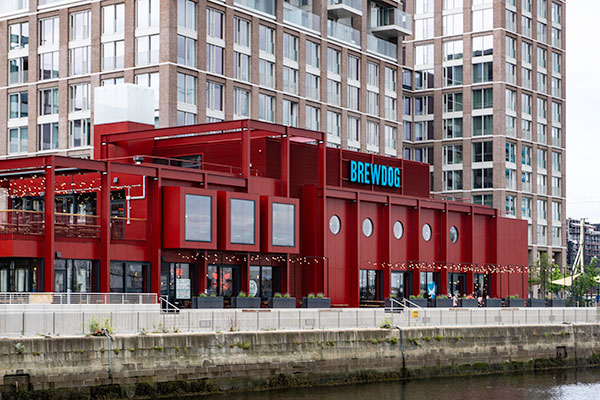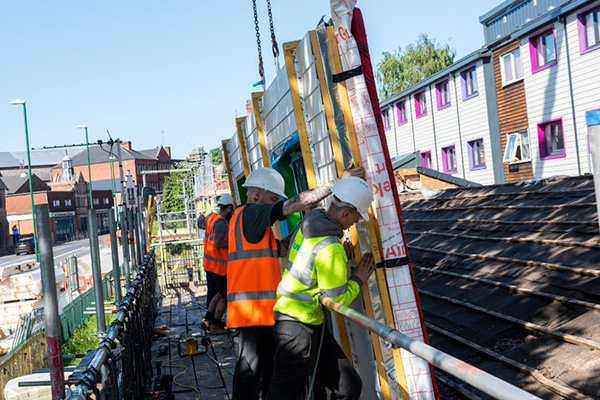You are viewing 1 of your 1 free articles

Climate change: do not leave it too late
Many in the sector are still waiting for government to direct them to act on climate change. Michael Appleby says that social landlords should be following the example of consumer brands such as BrewDog, which are taking immediate steps
BrewDog is one of my favourite organisations. Not only does it have an excellent selection of beers and IPAs, but it also has an incredibly innovative and responsive approach to marketing, branding and product development. Specifically, BrewDog has very strong ethical and environmental values committing to tackle climate change (think renewable energy sources for their breweries, electric delivery vans and carbon-negative bars) and a range of other issues.
As part of its ongoing communications, BrewDog recently posted an image on Twitter that included the quote “after 2030 it’s too damn late”, and listed a number of companies that have committed to becoming carbon neutral, but not until 2040 or 2050 – the background context being that most scientists are forecasting that we have until 2030 to stop irreversible damage to the planet.
So although this is a move in the right direction, it may be a case of too little too late.
It makes me think about the housing sector and whether it is moving in the right direction quickly enough, or whether it’ll be too little too late?
So far, the signs are not good. Following our own sector-wide survey to test where the sector is at present in tackling climate change, the results are not promising. For example:
- Nearly two-thirds of organisations have sustainability targets in place, but no specific plan on how to meet them
- None of the organisations in our survey had plans to become carbon neutral within the next decade
- Nearly 60% of organisations say that their funding for climate change activities is likely to be focused on government grants
- Nearly three-quarters do not believe they have the skills available at present to develop a sustainability strategy
Many people are seeing climate change as too big an issue to even begin to comprehend. But at the end of the day, we should be approaching it as a change programme. To have an impact, we need to design the future vision, set out the activities required to deliver that vision and work to embed changes in behaviour.
This is not the first and it will not be the last big change programme for the sector to deal with. The most recent big change programme was the technology revolution, which has slowly resulted in an increase in digitally based services, customer offers and approaches to service delivery in the sector.
There are lessons to be learned from that programme in the sector. As shown in our Future Gazing Future Shaping reports in 2016 and 2019, although there were notable exceptions, overall, the sector was slow on the uptake and implementation of new technologies. It found itself behind the curve of most other consumer-based sectors. There is a risk that the sector is in danger of making the same mistakes again.
With climate change, we do not have the same luxury of being part of the ‘late majority’, 2030 is the date the cut-off point, in the most literal sense it is a genuine burning platform.
In addition to saving the planet, there are also some strong business reasons for embracing sustainability. A genuine commitment to developing a track record in sustainability and climate change initiatives will enhance brands and create competitive advantages – working for both customers and employees. A well-structured programme can also generate efficiencies, creating capacity for investment and innovation in other areas, as well as benefits for customers too.
“Many are waiting for guidance to come out from government or another body before acting. This will take time and it is incumbent on us all to make progress in the meantime”
So, what can we learn from the digital evolution in the sector to help ensure that the climate change programme is more effective?
- Vision: It all starts with strategy. The sustainability agenda needs to be embedded into the vision of the future for every organisation and aligned to any other change programmes being implemented. It should not be treated as a sideline activity. It is core to how every organisation should work in the future. Resist the temptation to jump to tactical solutions too quickly – think big, then plan.
- Lead: We need leaders across the sector and within organisations to embrace and ‘own’ the issue. This includes leaders at the top, but also key champions at an operational, customer and corporate level to provide leadership and momentum, and drive to the programme forward.
- Programme: Treat this as a change programme, resource it properly, scope it out, and put the right programme governance structure in place.
- Skills: Get the right skills in place, identify what is needed at board, executive and staff levels in the business. Identify the gaps and resource them quickly.
- Collaborate: We do not all need to reinvent the wheel. There is a huge opportunity here for cross-sector collaboration with organisations working together. Identify partners who can support and similar organisations that have the same pains. For our survey it was identified that 84% of respondents are keen to be involved in a cross-sector sustainability working group.
- Behaviours: Like with other transformation programmes, this all comes down to behaviours – if we do not shift behaviours (staff and customers) we will not make a difference. Engagement should be carefully planned to encourage desired behaviours.
And finally, lead and do not simply wait for direction. Many are waiting for guidance to come out from government or another body before acting. This will take time and it is incumbent on us all to make progress in the meantime.
We have created this crisis and the housing sector has a critical role in the UK in contributing to the solution. Let us learn from the likes of BrewDog and not leave things too late.
Michael Appleby, markets and growth director, Altair
Sign up for our asset management newsletter
Already have an account? Click here to manage your newsletters














